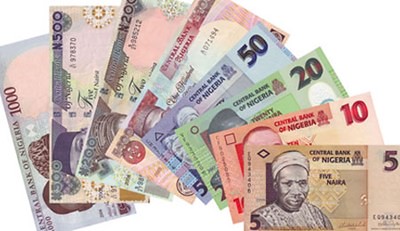
Federal Republic of Nigeria banknote known as the Naira., a photo by Pan-African News Wire File Photos on Flickr.
Pressure on Naira, Govt’s Revenue Weakens External Reserves
22 Sep 2013
By Festus Akanbi and Obinna Chima
Nigeria ThisDay
Nigeria’s external reserves, whose upswing had been restrained since the second quarter of the year due to the pressure faced by the naira and decline in government’s revenue, reduced further to $46.087 billion last Wednesday.
The flow of revenue determines the viability of the 2013 budget assumptions. The budgetary scope of the government in 2013 was essentially based on the assumption of N160/$1 exchange rate, an oil production of 2.53 mbpd, benchmark oil price of $79 a barrel and a projected Gross Domestic Product (GDP) growth rate of 6.5 per cent.
However, government revenues have continued to face significant pressure due to the decline in oil production caused by the combined effects of oil theft and pipeline shutdown due to the burgeoning illegal trade.
This situation has dampened the country’s foreign exchange reserves, a report has also shown.
Data gathered from the Central Bank of Nigeria (CBN) showed that the amount represented a decline by $972 million, compared to the $47.059 billion foreign exchange reserves as at August 1, 2013.
The naira has been volatile, especially at the interbank, bureau de change and parallel segments of the forex market, even as the central bank continues its defence of the nation’s currency at the official market.
However, the nation’s currency strengthened on Thursday after the United States of America’s Federal Reserve refrained from reducing stimulus that had triggered a rally across emerging markets.
Federal Reserve policy makers led by its Chairman Ben Bernanke had said that they want more evidence of lasting improvement in the United States economy before paring the central bank’s $85 billion monthly bond-buying programme.
But Afrinvest Securities Limited, in a report titled: “Naira Trending Towards 2015,” made available to THISDAY at the weekend, argued that the incorporation of a long term diversified strategy in fiscal policy was required to deliver the cushioning support for shocks in various segments of the economy.
It also pointed out that there was an increasing need to diversify the country’s revenue sources.
The report added: “The current over-reliance on oil receipts (oil receipts account for 96.8 percent of the country’s total exports) by the government poses a huge threat to the stability of the economy. The persistent pressure on the naira could have been minimised if a counter cyclical fiscal policy is developed, as the CBN cannot continue to defend the naira with foreign reserves.
“To reduce this pressure, an inward looking policy (tax incentives, infrastructure development and production subsidy) should be emphasised to reduce the dependence on imported goods. Asides from oil receipts, the development of the Agricultural sector will in the short term reduce the foreign exchange burden of food imports and over the long term enhance foreign receipts if its comparative advantage in the sector is efficiently deployed.”
It stated that a review of the economies of other oil dependent countries (Middle East and North Africa) showed that countercyclical fiscal policies were key to subduing the “oil curse” of periodic instability and slow development.
“The Nigerian government should work towards a longer term commitment to benchmark oil prices, as against the current yearly debates and bargaining that surrounds budget preparation. In addition, emphasis should be geared towards the diversification of the foreign receipts base of the economy.
“Afrinvest Research recommends the adoption of an approach of longer term forecasting for key monetary policy indicators (especially interest rate and exchange rate) as exemplified by the US Federal Reserve.
Such forecasts should seek to cover the expected policy direction over a minimum of three years,” it added.
It also suggested that the opportunity cost of attracting and retaining foreign portfolio investments in the country by keeping interest rate high needs to be re-examined.
Also, the report expressed concern that domestic lending rates have remained high (above 20%) given the current risk pricing and the CBN’s restrictive monetary policies, even as it suggested that policies that would stimulate lending in order to stimulate economic growth should be designed.
“The inflow of foreign capital into the economy should constitute a buffer for the naira.
"The naira is poised to remain at the mercies of adverse capital flows should the relative calm that surrounds quantitative easing eases,” it added.
No comments:
Post a Comment